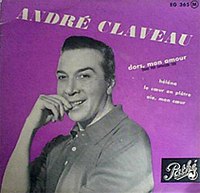Dors, mon amour
 "Dors, mon amour" "Dors, mon amour" | |
|---|---|
 | |
| Eurovision Song Contest 1958 entry | |
| Country | |
| Artist(s) | |
| Language | French |
| Composer(s) | |
| Lyricist(s) | Hubert Giraud |
| Conductor | Franck Pourcel |
| Finals performance | |
| Final result | 1st |
| Final points | 27 |
| Entry chronology | |
| ◄ "La Belle amour" (1957) | |
| "Oui, oui, oui, oui" (1959) ► | |
"Dors, mon amour" (French pronunciation: [dɔʁ mɔ̃n‿amuʁ]; "Sleep, My Love") is a love song written in French by Hubert Giraud, composed by Pierre Delanoë and performed in 1958 by André Claveau as France's entry and the winner of the pan-European Eurovision Song Contest, gaining other versions and minor commercial success.
Described as a romantic "lullaby", the song won the 1958 edition of the Eurovision Song Contest where it beat the runner-up by a small margin, and gained several cover versions including by other Eurovision entrants, with the original version gaining music chart achievement in Belgium and featured in another commercially successful album.
Composition
"Dors, mon amour" is a love song, expressed by the singer telling his lover to sleep, while he muses on their love and the power of the night.[1] It is reviewed as "a classical sort of lullaby", and is compared to newer editions entries songs as "hardly indicative of the camp and bombast which would later come to define Eurovision."[2]
The song was also covered in French in 1958, by the 1957 Eurovision winner Corry Brokken, Achille Togliani and Germana Caroli. It is covered in German by Camillo und die Bernd Hansen-Sänger as "Unser Glück, mon amour" and in Swedish by 1958 Eurovision entrant Alice Babs as "Sov min älskling".[3]
Eurovision Song Contest
"Dors, mon amour" was selected as France's entry to the 1958 edition of the annual Eurovision Song Contest through a televised show titled "Et voici quelques airs", where it beat four other French songs.[4] At Eurovision, it was performed third in a field of ten, following the Netherlands' entry "Heel de wereld" and preceding Luxembourg's "Un grand amour". By the close of voting, it had received 27 points, placing it first, with three points above Switzerland. This is the first winning entry sung by a male leading vocalist, following the 1956 and 1957 editions.
The song was succeeded as French representative at the 1959 contest by "Oui, oui, oui, oui", sung by Jean Philippe, and as contest winner by "Een beetje", sung by Teddy Scholten representing the Netherlands.
Charts
"Dors, mon amour" is marked as a numberless "peak"-note position on Belgium's Walloon region single music chart for the week of 1 June 1958,[3] and is included in the 2005 compilation "50 Years Of The Eurovision Song Contest 1956 - 1980" which charted in Switzerland.[5]
References
- ^ "Dors, mon amour - Diggiloo Thrush". diggiloo.net. Retrieved 2024-04-22.
- ^ MELLO, DAVID (11 July 2021). "Eurovision: The First 10 Winners (& Their Songs)". Screen Rant. Retrieved 27 November 2022.
- ^ a b "André Claveau – Dors, mon amour". ultratop.be. Retrieved 27 November 2022.
- ^ "France: Et voici quelques airs". Eurovisionworld. Retrieved 2024-04-22.
- ^ "50 Years Of The Eurovision Song Contest 1956 - 1980". hitparade.ch. Retrieved 27 November 2022.
External links
- Eurovision World page for 1958
- Detailed info & lyrics, The Diggiloo Thrush, "Dors, mon amour".
| Preceded by | Eurovision Song Contest winners 1958 | Succeeded by "Een beetje" by Teddy Scholten |
 | This article about the music of France is a stub. You can help Wikipedia by expanding it. |
- v
- t
- e
 | This 1950s song-related article is a stub. You can help Wikipedia by expanding it. |
- v
- t
- e
 | This article about the Eurovision Song Contest is a stub. You can help Wikipedia by expanding it. |
- v
- t
- e












